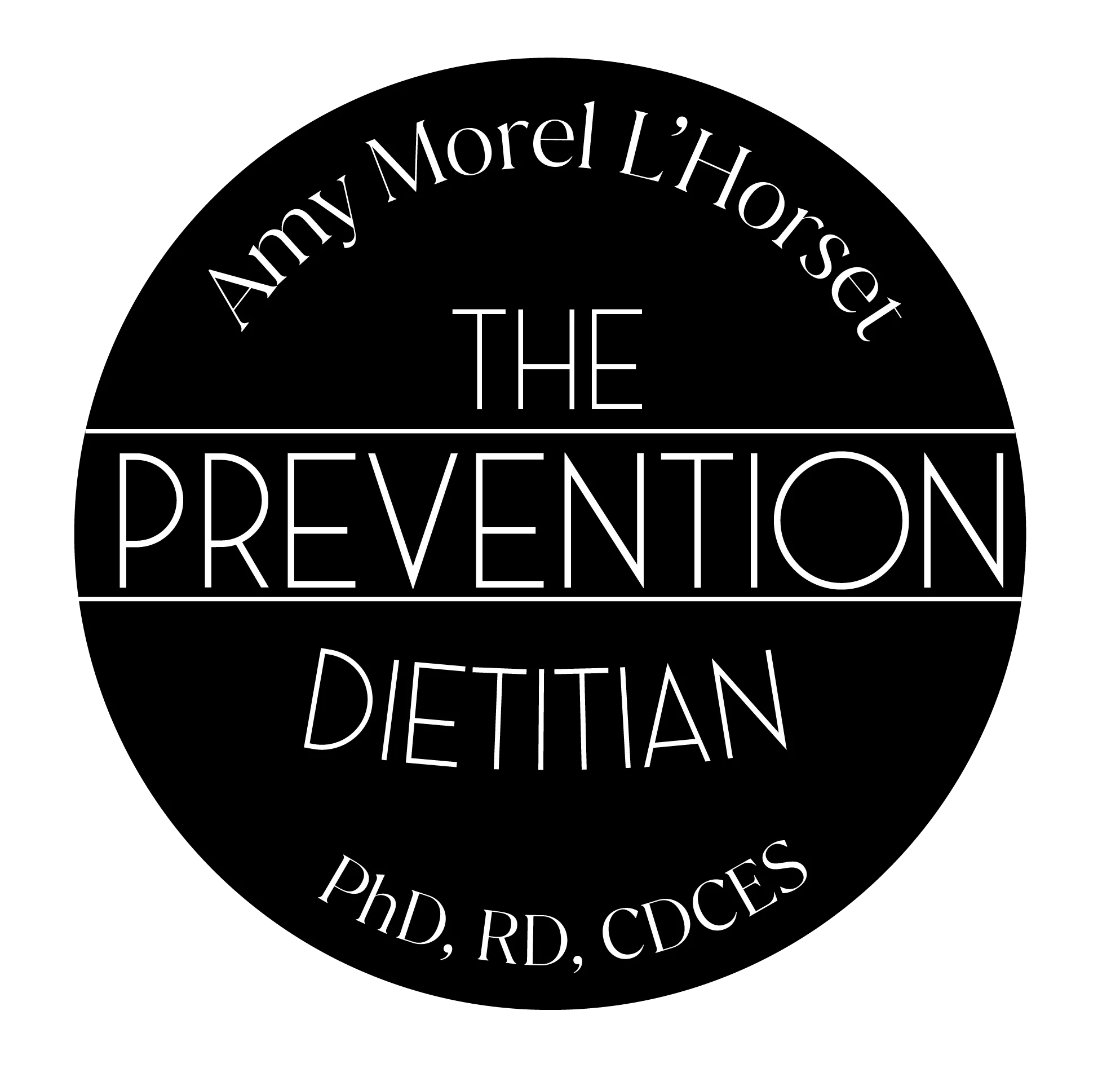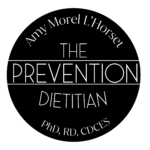Did you just discover that you have prediabetes?
Or perhaps you’ve had prediabetes for a while but things aren’t going so well. You are ready to stop the DIY prediabetes plan and fire Dr. Google.
You want to find professional help but you aren’t quite sure where to start?
Maybe you’ve heard of “Registered Dietitians” but you aren’t exactly sure what they do, how they can help, or where you can find a dietitian who specializes in prediabetes.
If this sounds like you, two things: 1) Welcome to the club, and 2) I’ve got you covered.
Here’s what you can expect to take away from this blog post:
- What is a Registered Dietitian (RD) and what makes them different other “nutrition experts”?
- Three places where you can find RDs who specialize in prediabetes and the pros and cons of each.
- Questions to ask your health insurance to see if you have coverage for nutrition counseling.
- How to get started working with a prediabetes RD.
What is a Registered Dietitian?
A Registered Dietitian (RD) is a food and nutrition expert who has met academic and professional requirements including:
- Earned bachelor’s degree masters (over half of RDs hold advanced degrees; a master’s degree is required by 2024)
- Completed a 1200-hour accredited, supervised internship
- Passed a national board exam
- Completes continuing professional educational requirements to maintain registration on an ongoing basis
- Held to a professional code of ethics and required annual ethics training
- Some RDs also hold additional certifications in specialized areas of practice, such as pediatric or renal nutrition, nutrition support and diabetes care and education.
Registered Dietitians translate the science of nutrition into personalized and practical lifestyle solutions for achieving and maintaining health. RDs provide nutrition care services for the prevention, management, and treatment of disease. RDs are the only profession that is credentialed to provide medical nutrition therapy.
Three Places Where You Can Find and Work With an RD
Join a CDC Diabetes Prevention Program
Enroll in a CDC-recognized Diabetes Prevention Program (DPP) — a group structured lifestyle change program focusing on healthy eating and physical activity.
It really blows my mind that <5% of people with prediabetes know about the DPP!
DPPs are often community-based (YMCAs, faith-based organizations) and FREE! They are also offered by health care organizations, private insurers, and employers. You will need a referral from your healthcare provider and/or a copy of your lab result showing you have prediabetes (Hemoglobin A1C).
You can find a DPP here by plugging in your zip code and/or searching online programs: Find-a-Program
*Please note that not all DPPs are facilitated by RDs. Many programs use trained Lifestyle Coaches. You can ask for more information when you reach out to your local DPP: “Hi, I’m interested in your diabetes prevention program. Who facilitates the classes?”
Pros:
- Often free to people with prediabetes or at high risk for type 2 diabetes (women with a history of gestational diabetes, people with obesity).
- DPPs are research-based with a CDC-approved curriculum. No hocus-pocus!
- DPP facilitators are trained Lifestyle Coaches.
- DPPs offer group social support. The people in DPP classes are dealing with similar struggles as you.
Cons:
- The DPP is not personalized. For example, if you are someone who has prediabetes + additional health issues (GERD, PCOS, etc), these other health concerns will not be addressed during the DPP.
- The DPP is curriculum-based and focuses on “healthy eating”. If you wish to follow a specific diet (Mediterranean, vegan, very-low carbohydrate, etc), it will not be covered in depth in the DPP.
- The DPP generally meets on specific days/times which may conflict with your personal schedule.
- Some DPPs only have particular start dates during the year. You may have to wait until the next program cycle start date.
Use Your Health Insurance Benefits
If you’ve been considering working 1:1 with a Registered Dietitian (RD) but were unsure if your insurance would cover the cost of prediabetes nutrition and lifestyle counseling, you’re not alone. Some health insurances cover RD visits, but the process of finding out can be confusing.
Here are some helpful tips to determine if your health insurance covers prediabetes nutrition counseling and what to do if it doesn’t. I hope this information helps make working with a RD easier for you!
First, pull out your insurance card and call the 1-800 number. Here are some questions to ask:
- Does my insurance cover specific conditions such as prediabetes, impaired fasting glucose, or impaired glucose tolerance
- Is nutrition counseling covered? (the procedure codes are 97802 and 97803)
- Are there restrictions on which diagnoses are covered?
Is Z71.3 (dietary counseling and surveillance) covered, or is a medical diagnosis required*? - Do I need a referral or prior authorization? If so, who can make the referral?
- Is nutrition counseling covered when provided via telehealth?
- Am I limited to a specific number of visits each year?
- Is there a copay to see an RD?
- Are other preventive services covered? For example, does my plan cover counseling for overweight or obesity?
- Given my deductible for the year, including copays and coinsurance, what will I need to pay out of pocket to see an RD?
If your insurance doesn’t cover nutrition counseling, consider using your Health Savings Account or Flexible Savings Account if that is an option for you.
If you choose to see an RD who is out-of-network with your health insurance, you can ask the RD for a Superbill. A Superbill is a receipt of a medical service provided when you pay out-of-pocket. It will include the codes required by your health insurance company but will be up to the insurance company to determine any reimbursement.
Next, if you are considering working with an RD through your insurance, please keep in mind that we all have different specialties so make sure you do your homework first to make sure they specialize in your needs. Some RDs have specialized training in diabetes care and hold a board certification. They are called Certified Diabetes Care and Education Specialists (CDCES).
You can find an RD here: find-a-nutrition-expert
You can find an RD CDCES here: cbdce.org/locate
Pros:
- You want 1:1 personalized counseling for prediabetes.
- You want an RD who can address your other health issues, in addition to prediabetes, and/or provide resources and referrals to specialists.
- Your health insurance may cover all or some of the costs of working with an RD.
Cons:
- Your health insurance may only cover a specific number of visits and you want more.
- You may want to work with an RD who is out-of-network with your insurance.
- Some RDs only offer small group counseling. Do your homework and ask questions.
- You want to see a virtual RD and your insurance doesn’t cover telehealth.
Make a Personal Investment in Your Health
You may want to invest personal finances into working with an RD. Why?
Maybe your insurance only covered 3 visits and you want more. Maybe you completed the DPP and it left you longing for individualized counseling.
Perhaps you want to work with an RD you discovered through word-of-mouth or on social media and they are out-of-network with your insurance or private-pay only.
You may want top-notch scheduling flexibility, virtual meetings, personalized meal-plans, and/or weekly accountability check-ins. It is OK to admit that you want a VIP EXPERIENCE!
You can find an RD here: find-a-nutrition-expert
Reach out and book a discovery call to see if they are the right fit for you.
Again, you can find an RD, CDCES here: cbdce.org/locate
Reach out and book a discovery call to see if they are the right fit for you.
Pros:
- RDs provide 1:1 personalized counseling for prediabetes.
- RDs will be able to address your other health issues and/or provide resources and referrals to specialists.
- RDs who are prediabetes specialists will cover areas beyond nutrition such as stress management, healthy coping, sleep, and physical activity – think of it as a one-stop-shop for your prediabetes management plan.
- You can interview and choose the best RD for you (for example, you may prefer a female RD who specializes and works specifically with women).
- RDs may provide appointment flexibility, customized meal plans, weekly accountability check-ins, and/or ongoing support groups.
- You are not limited by your insurance parameters such as # of visits, virtual options, etc.
Concern:
- Making a financial investment in your health can be a scary leap and you may not be ready yet.
Action Steps for Working With a Registered Dietitian:
Ok, now it is time to put all of this into action! First, don’t get stuck in “analysis paralysis”. You can choose one option and start working on that today. You can always shift gears later.
“A fresh start is always possible. You’re never too deep into anything to rethink, reroute, and start fresh.”
~ Amber Janae ~
A quick review of options:
- You can start with the CDC DPP either in-person or online. Visit Find a Program, plug in your zip code and make the call.
- If you prefer a 1:1 experience, you can call your insurance today to see if you have coverage for nutrition counseling with a RD. I listed the questions you should ask your insurance above. You can do both the DPP and RD options. You can work 1:1 with an RD before, during or after the DPP! Visit: find-a-nutrition-expert and cbdce.org/locate to locate RDs.
- If you do not have insurance coverage and/or prefer to work with an RD who is out-of network with your insurance or private-pay only, go for it! You deserve the best option for you. Your health is the smartest investment that you can ever make.
Finally, I would love to hear from you. Let me know the option you are going to try today. You can comment below or send me a message here.
P.S. If you are ready to learn more about the Hemoglobin A1C test, head on over to my blog article, Why You Need to Schedule a Hemoglobin A1C Test and Track Down Your Past Results.
Do you know someone with prediabetes who is looking for this information? Please share it!
Wishing you all the best on your journey!





